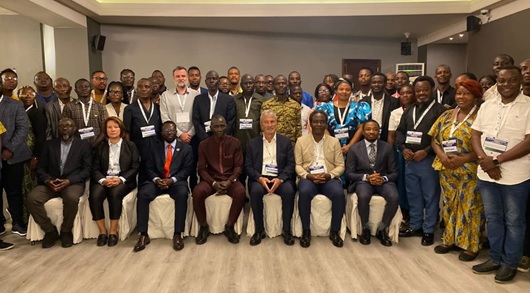Liberia Takes Giant Leap Towards Data-Driven Governance -Partners with AU to Strengthen Data Governance Framework
MONROVIA – Liberia is taking a major step towards harnessing the power of data to drive its development agenda, through the Ministry of Posts and Telecommunications, launching a two-day multi-stakeholder consultation aimed at shaping the country’s first National Data Policy. The consultation, held in collaboration with the African Union Commission (AUC), brings together representatives from government, civil society, academia, the private sector, development partners, and the media to co-create a framework for data governance, protection, and utilization. As The Analyst’s H Matthew Turry reports, the initiative is part of the broader continental effort to implement the African Union Data Policy Framework (AUDPF), which provides a shared vision and guiding principles for secure data flows across Africa.
The Government of Liberia, through the Ministry of Posts and Telecommunications, in collaboration with the African Union Commission (AUC), has launched a two-day multi-stakeholder consultation aimed at shaping the country’s first National Data Policy.
The consultation, held from November 13–14, 2025, in Monrovia, brings together representatives from government, civil society, academia, the private sector, development partners, and the media.
This engagement marks a major milestone in Liberia’s journey to establish a coherent national framework for data governance, protection, and utilization—a cornerstone of its expanding digital transformation agenda. As Liberia leverages technology to enhance public services and drive innovation, effective data management and protection have become vital for ensuring transparency, efficiency, and inclusive socio-economic development.
According to organizers, the forthcoming National Data Policy will ensure that data is treated as a strategic national resource, one that strengthens evidence-based decision-making, improves service delivery, and fosters trust between citizens, government, and the private sector.
The initiative forms part of the broader continental effort to implement the African Union Data Policy Framework (AUDPF), adopted by AU Member States in February 2022.
The AUDPF provides a shared vision and guiding principles for secure data flows across Africa, protecting citizens’ rights and promoting the responsible use of data to advance economic growth, digital trade, and innovation.
The Framework seeks to create a “shared data space and standards” to regulate data production and use. Emphasis is on inclusive transformation, data sovereignty, intra-Africa digital trade, building trust, and enabling people and institutions to harness data.
Through the consultation, Liberia aims to draw lessons from regional best practices and expert insights to design a policy that reflects national priorities while aligning with continental standards.
The process underscores inclusivity and national ownership, engaging stakeholders across sectors—government, civil society, academia, private institutions, and development partners—to co-create the foundation for Liberia’s National Data Policy.
The initiative is part of the AU-led project “Empowering Governments to Develop, Adopt and Manage Data Governance Frameworks in Africa.”
Speaking at the opening, German Ambassador Dr. Jakob Haselhuber emphasized the critical role of data governance in sustainable development.
He noted that while challenges remain, “this workshop can make a significant impact in the development of Liberia’s data framework.”
Also addressing participants, Ambassador Nona Deprez, Head of the European Union Delegation to Liberia, described the gathering as both “important and timely.”
“I would like to urge you to adopt this multi-stakeholder inclusive approach as you start this training to develop your national data policy, with a participatory approach that includes not just government agencies but also the private sector and civil society,” Ambassador Deprez said.
She further encouraged participants to ensure that the policy “reflects the needs and priorities of the Liberian population,” reaffirming the European Union’s commitment to supporting Liberia’s digital advancement.
Also speaking, Minister of Post and Telecommunications Sekou M. Kromah expressed gratitude to the European Union, the African Union Commission, and other partners for their sustained support in driving Liberia’s digital transformation.
He noted that the consultation comes at a critical moment in Liberia’s shift toward data-driven governance.
“Data is no longer just a technical asset but a tool for empowerment and growth,” Minister Kromah stated.
“Let us collaborate and hold it together. We can build resilient, inclusive, and ready data that governs the ecosystem,” he urged, while calling for increased investment in Liberia’s digital infrastructure.
A representative from the African Union Commission commended the Government of Liberia and its partners, noting that the initiative marks a digital turning point for the country. He underscored that data is a strategic resource, vital for fostering innovation, trade, and inclusive growth across Africa.

Comments are closed.